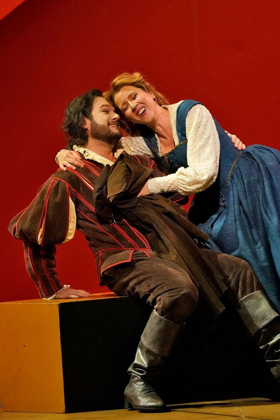Review: RIGOLETTO at Dorothy Chandler Pavilion

On May 12, 2018, Los Angeles Opera presented a searing rendition of RIGOLETTO, Giuseppe Verdi's dark tale of curses and murder. Recently, General Director Placido Domingo said of this work, "I can think of no opera that better demonstrates the power of deeply emotional music melded with incredibly gripping drama."
Director Mark Lamos, whose production of RIGOLETTO was last presented by Los Angeles Opera in 2010, emphasized the opera's contrast between good and evil. Only Gilda is completely blameless, yet she is the sacrificial lamb. When Rigoletto compared himself to the assassin Sparafucile, the audience began to realize that the jester was almost as destructive as the hired killer. Nevertheless, composer Giuseppe Verdi and librettist Francesco Maria Piave convinced listeners that despite his many crimes, this father who loved his daughter deserved their sympathy.
Michael Yeargan's scenery was inspired by the art of Italian metaphysical painter Giorgio De Chirico. Robert Wierzel's lighting made the scenic designs start out as pleasantly pastel, but slanted, buildings that gradually changed into sinister structures from which no good could come. Constance Hoffman's period costumes were attractive, detailed, and in the case of some of the female courtiers, quite revealing. I loved the blood-red gloves on Sparafucile.
Juan Jesús Rodriguez sang Rigoletto with resonant tones and a simple manner that made him seem a caring father for Gilda. Not until we see him with Sparafucile and hear his rendition of the great monologue "Pari siamo" ("We are similar") do we understand his troubled personality. He sang with complete conviction in the scenes at court. In his fine vocal rendition of the aria, "Cortigianni, vil razza," ("Courtiers, vile rabble") his intense acting showed the conflicting, sometimes violent, facets of his complex character. Later, he showed us Rigoletto's softer side as he tried to take Gilda to safety.
Lisette Oropesa was a truly magnificent Gilda. She portrayed her character's girlishness, innocence, and obsessive love. Her voice was clear and bell-like, especially above the staff. Her "Caro Nome" ("Dear name") was most impressive with its radiant, silvery tones and tasteful decoration. Amazingly, she finished the main part of her aria, climbed a long flight of stairs, and immediately began the trill that ends the scene. Twentieth century operagoers told tales of the legendary Erna Berger and her long trills. Twenty-first century patrons may have their own legend-in-the-making with Oropesa. She definitely is a singer to watch.
With a slim figure and a delightful lyric sound, Arturo Chacón-Cruz was a credible fickle lover. He sang that women were the untrustworthy ones in his aria ("La donna é mobile") ("Woman is fickle"). Singing with understanding and grace of phrase, he brought a considerable amount of restrained desire to the love duet with Gilda, but earthy passion to the duet with Maddalena.
Morris Robinson was a frightening Sparafucile who looked as though he could kill with his bare hands. Vocally, he seemed to find the part easy and when he finished his lines, he began to walk off stage still holding a very low note. I think he enjoys being a really good "bad guy." It was Craig Colclough's forceful delivery of Monterone's curse on both the Duke and Rigoletto that started the action and he gave a worthy portrayal of the enraged father.
Sharmay Musacchio was a traitorous Giovanna with a rather tight sound. Ginger Costa-Jackson was a devil-may-care Maddalena who began to fall for the Duke's charms as she sang with burnished low notes. As courtiers, young artist program members Liv Redpath, Joshua Wheeker, and Juan Carlos Heredia, sang with dramatic style and added measurably to this excellent performance.
Although Matthew Aucoin made his LA Opera main stage conducting debut with AKHNATEN last season, this was the first chance to hear him in a well known popular opera. His tempi were brisk, and after the first scene where the orchestra occasionally covered the singers, he gave them the instrumental base that they needed to give this excellent rendition of RIGOLETTO. He is an excellent young conductor from whom many great performances can be expected. He will conduct concert performances of his own opera, THE CROSSING, at The Wallis Annenberg Center for the Performing Arts on May 25 and 26.
Photos by Ken Howard for LA Opera
Add Your Comment
Videos
